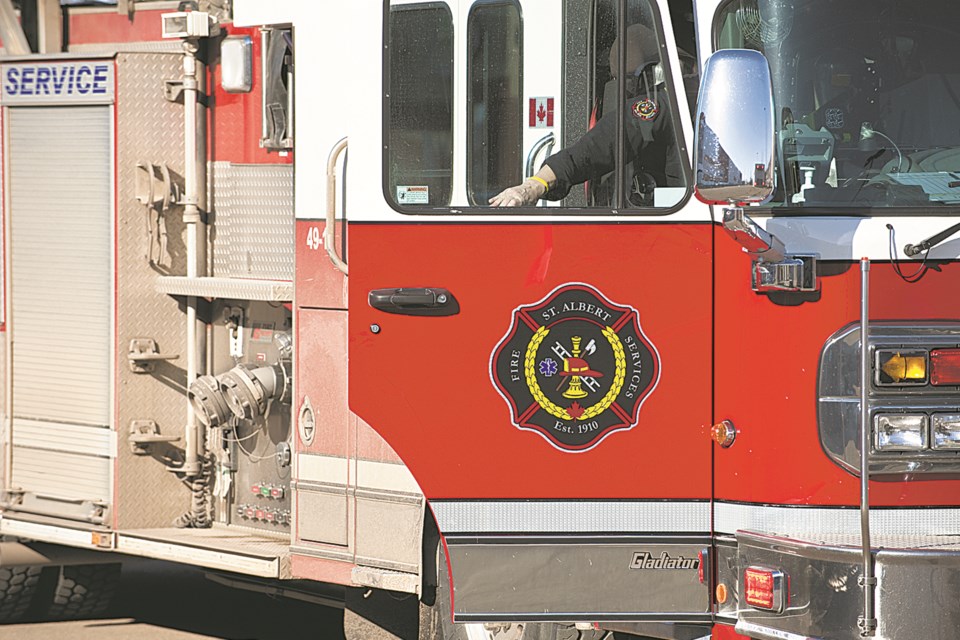Fire departments of today are still catching up from grin 'n’ bear it attitudes of yesterday toward mental health, contributing to chronically inflated overtime costs.
St. Albert Fire Fighters Union president Warren Gresik said the City of St. Albert is doing their best to address mental injuries among emergency services staff, but the city needs to be “doing more.”
“As a result of changing times, unfortunately departments are playing catch up to the needs of first responders from days of yesteryear,” Gresik said in an email. “This could be attributed to an increase in time loss for our organization.”
For the third year in a row, St. Albert is hiring new firefighters to help deal with an ongoing absenteeism trend and high overtime costs, in part due to increasing occupational mental injury claims.
Last year, the city spent $1 million more than it had budgeted on overtime for emergency services personnel (which covers firefighters, ambulance staff/paramedics and dispatch), preliminary figures up to Dec. 31 show. In total, the city paid approximately $1.5 million for overtime shifts in 2019, while only $426,500 had been budgeted, communications adviser Marci Ng said in an email.
Ng said occupational mental injury claims are on the uptick. In 2019, more than 70 per cent of total Workers' Compensation Board claim costs were related to emergency services occupational mental health injury claims. Two years prior, that number was 60 per cent.
City Coun. Sheena Hughes told the Gazette St. Albert needs to take a hard look at what is creating the ongoing overtime issue and find solutions beyond a “stop gap.”
“It's very expensive to do this, this is an expensive solution,” Hughes said. “And what we're really doing is a stop gap; we just keep hiring, hiring (and) hiring when what we really need to say is, what's creating the situation?”
Since April 2018, there have been between 10 and 19 emergency services personnel off on a “consistent basis," Ng said.
Members taking time off for recovery can often be away from the job for months at a time, Ng said, and in some cases require permanent accommodation outside of their emergency services position.
Reintegration help needed
Studies show first responders are significantly more likely to develop mental illnesses compared to the average population.
Nearly half of police, paramedics, firefighters and 911 dispatchers show symptoms of mental illness, according to a 2017 study published in in the Canadian Journal of Psychiatry. The study surveyed almost 6,000 participants, and 44.5 per cent were positive for symptoms consistent with one or more mental disorders.
In 2012, changes to Workers' Compensation Board legislation gave firefighters presumptive coverage, and Gresik said since then “more and more firefighters are coming forward with calls for help.”
While city administration is “doing what they believe they can, within the department’s current mental health program,” Gresik noted an area of improvement would be in reintegration.
Implementing a consistent reintegration program could have better long-term success for members returning to work after being treated for mental health illness, Gresik said, reducing the need for overtime shifts to cover absenteeism.
“We are grateful for the efforts of administration. Unfortunately, change takes time,” Gresik said. “We recognize that we have come a long way in a short period of time and accomplished much, but are committed to doing more and better.”
Coun. Ken MacKay, who comes from an emergency services industry background, said investing in mental health can save money down the line.
“This isn't just financial; there's a human element here that we have to deal with,” he said. “If you're gonna do a return on investment, I would have to say that if you invest a little bit of money in mental wellness, you're going to save a lot more money in other downstream costs.”
This year, St. Albert Fire Services (SAFS) – which has been experiencing “excessive overtime, fatigue, and low department morale,” the city’s proposed 2020 budget said – will be training 10 new firefighters.
City council approved those hires during budget deliberations in the fall and plans to hire another 20 emergency services personnel over the next two years.
Eventually, the new hires in 2020 will help staff the future Firehall #4, but in the short term they will be used to offset excessive overtime. This year, new staffing costs will be just over $1 million.
Ten new firefighters were also hired between 2018 and 2019.
Ng said overtime is expected to decline this year, since SAFS’s 2019 recruit class – including medics – has completed its training and is now active and operational.
Paramedics are partially funded from St. Albert's contract with Alberta Health Services and patient billings.
Current mental health supports
Facing potentially traumatic events is par for the course in the emergency services industry, but Ng said the city works hard to provide preventative training and resources to employees.
St. Albert is also working with its joint health and safety committee to find ways to mitigate staff absenteeism related to occupational injuries, she said.
One effective method the city leans on is a mental health peer support team, which is made of trained colleagues who identify and support members who have been exposed to “critical incidents.”
Firefighters are also offered a Road to Mental Readiness training program, which is geared towards reducing stigma of mental illness and increases resiliency.
In addition, St. Albert is developing a corporate mental health first aid program to be used across the entire organization, Ng said.




